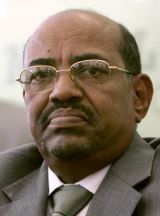Sudan’s Bashir says hybrid force must be African
By wasil Ali
Jan 23, 2007 (KHARTOUM) — Sudan has reiterated rejection of the deployment of international troops in Sudan’s troubled region of Darfur. He further said that Sudan agreed a UN hybrid force plan provided that this force remains African
 President Omar Hassan al-Bashir renewed opposition of Sudan to deployment of international troops to Darfur region, stressing the approval of UN plan for peacekeeping force that this force is to be African and African-led, with logistical support from the United Nations.
President Omar Hassan al-Bashir renewed opposition of Sudan to deployment of international troops to Darfur region, stressing the approval of UN plan for peacekeeping force that this force is to be African and African-led, with logistical support from the United Nations.
The Sudanese president also acknowledged on Tuesday 23 January in an interview with the BBC Arabic Service that the Sudanese army bombarded positions of the rebel movements in North Darfur explaining that the bombing included the rebel groups that have been fighting the Sudanese armed forces, not civilians.
Last August, Sudan rejected U.N. Security Council Resolution 1706 authorising some 22,500 U.N. peacekeepers and police to take over an under-staffed African Union force in Darfur.
In December 2006, al-Bashir softened his position agreeing to a “hybrid operation”. In a letter sent to UN Secretary General Kofi Annan, he reaffirmed Sudan’s readiness to start immediately, through the Tripartite Committee, the implementation, of the Addis Ababa Conclusions and the Abuja Communiqué.
The three-phase plan — agreed in Addis Ababa and confirmed in AU mini summit in Abuja — is expected to comprise about 17,000 troops and 3,000 police officers.
Bashir’s letter left the size and the command of the hybrid force to be deployed in the third phase of the plan, without a solution.
The plan includes sending 105 military officers and 33 police and 48 international staff, 36 armored personnel carriers, and night-vision goggles, and equipment for the use of GPS satellites to join the AU forces in Darfur. .It also includes sending several hundred military forces of the United Nations, police and civilian personnel, in addition to logistical support and air.
At least 200,000 people have been killed and 2.5 million driven from their homes since mostly non-Arab rebels took up arms in early 2003 accusing the government of neglect. Khartoum rejects Washington’s description of the violence as genocide.
(ST)
